by Leslie Layton and Denise Minor
When Vickie Nailing first came to Chico to pursue a master’s degree in 2015, she was taken aback by how friendly people were. She loved the community’s “hippy vibe” that reminded her of the 1970s.
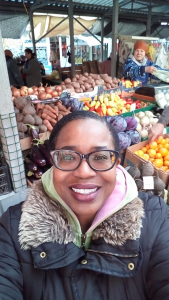
“When I would pass strangers they would look me in the eyes and smile,” said Nailing, a graduate student in the Teaching International Languages program. “I’m from L.A. I wasn’t used to that.”
Nailing left Chico one year later to train English teachers in Ukraine on a Peace Corps program. When she returned in January, she sensed that something in the city had changed. Nailing, an African-American re-entry student, says she sometimes found herself facing upfront hostility and defensiveness.
“I feel racism here now,” she said. “I didn’t feel that before.”
Both students and community leaders interviewed for this story said racist sentiment in the community has become more overt, more direct, since the 2016 presidential election. (See our “Documenting Hate” sidebar.) Some students also believe that the city’s character has been altered by the explosion in growth since the Nov. 8 Camp Fire that destroyed neighboring Paradise.
“Since Trump took office, we’re seeing more incidents that aren’t just microaggressions,” said an African-American woman, a fourth-year student at Chico State, who asked not to be identified by name because of security concerns. “More students say they’re being called the N-word and having rocks thrown at them.”
Aramenta Hawkins, the executive director of the Chico Peace & Justice Center, said there has been a marked increase in the number of people reporting racist incidents that may be due to both the volatile 2016 presidential election and to the use of social media and technology that encourage discussion and capture interactions.
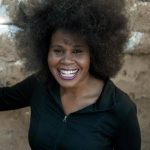
“It runs the gamut from racial slurs to physical interaction to being intimidated to the feeling some students have that they’re getting treated differently,” says Hawkins. “It’s verbal, it’s physical and it’s systematic.”
In interviews with ChicoSol, Chico State students said they want the administration and the University Police Department (UPD) to become more proactive in supporting people of color and ensuring a safe campus environment, and some took that message to a March 8 meeting attended by students, Chico State President Gayle Hutchinson and campus police.
Students who belong to the Carter Scholars Black Excellence Academic Program – a support program that holds regular study sessions in Meriam Library — said the UPD failed to communicate clearly and respond swiftly when reports surfaced early last month about a man lurking in the library and rumors flew through social media that he was watching students work and asking about emergency exits.
Police later identified the man in question as Daniel Darrington, a Butte College student who had been arrested in 2015 for allegedly carrying a loaded, concealed firearm to a movie theatre.
“Because of some of the man’s rants on his videos on social media, he was perceived to be a racist and misogynist, and our black students articulated feeling most vulnerable,” Chico State spokesman Sean Murphy said in an emailed statement to ChicoSol, adding that he was uncertain when the videos were made.
“To our knowledge, there was no specific language and no direct threat toward students of color (or anyone else) when he was on campus,” the statement says.
Darrington was issued a seven-day stay-away order that has since expired, and the university’s March 29 statement said that “to our knowledge” he hadn’t returned to campus.
Murphy’s statement says Chico State will host a “Safety Summit” this month for further discussion. “It will require a collaborative effort between the campus and community to be most successful,” the statement says. “We are consulting colleagues across the country as they are also dealing with similar concerns.”
Many minority students say they’re hesitant to ask campus police for help because they’re likely to be treated as suspects rather than victims.
Bree Jones, a 22-year-old Carter Scholar, said that because so many of her peers don’t trust UPD, she asked campus police to meet with students in January, an appropriate time because it was Black History Month. “They never got back to me,” Jones said. “They’re not approachable.”
UPD’s chief John Reid also didn’t get back to ChicoSol when this publication requested an interview.
Confronting racism
Last fall, students at a meeting at CSUC’s Cross Cultural Leadership Center discussed what they were facing off campus. Most of the students in a group of about 10 African-Americans said someone had used the N-word or another slur to offend them since they had come to Chico. A young woman talked about the rage she felt when she was pushed aside on a downtown sidewalk by someone using the N-word.
Soon, the students were debating whether to ignore racial slurs or confront the people who use them.
Robert Morton, an African-American university staffer who attended the CCLC gathering, warned students that responding with anger could harm them more than it would the perpetrators. People of color who demonstrate anger elicit a different response than do white people demonstrating anger, he said.
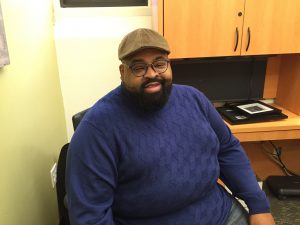
“This is one of those corollaries you wrestle with as a result of your blackness,” Morton said in an interview with ChicoSol. “If I’m silent, I’m complicit to it happening to someone else, but in that same rush of emotion, you wrestle with, ‘What are the implications of my response?’ You have to be very thoughtful in how you respond to these incidents.”
Morton, a Title IX investigator who ministers at Chico’s Bethel AME Church, said the students are facing a dilemma that is now commonplace for people of color.
“The president’s rhetoric has made it OK to be filled with hate,” Morton said. “People of color have had to figure out how we manage ourselves in these circumstances — which is tough when you don’t have tons of experience dealing with it or feel like you have the resources or support to manage it.”
Use of the N-word to denigrate African-Americans goes well beyond incivility, Morton observed.
“There’s an emotional piece connected to this,” he said. “It’s akin to having a person slap, spit, punch you in the face. It’s what it carries with it — it’s a brick. You are aware that in our country you are viewed as ‘less than’… there’s something about that word that conjures up a feeling that is both rage-filled and helpless at the same time.”
Because African-Americans are a small minority in a predominately white community –about 2 percent of the city’s population and 2.6 percent of Chico State’s student body – racial profiling is also a problem.
Vince Haynie, a local pastor who works with Chico State’s Research Foundation on a program that brings South Korean students to campus every year, was shocked when he learned that someone had called the police to question whether he could be a child trafficker as he escorted a group around town.
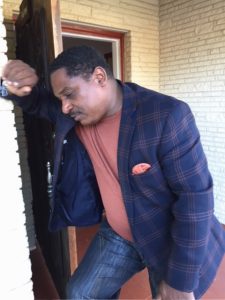
Haynie and a church deacon took the South Korean students — five young women and two young men — to a local nail salon on Jan. 24. Haynie left to attend a brief meeting while the women were treated to manicures. When he returned, he learned police had been there on a “welfare check.” A customer had called to report that two black men had come to the salon with “Asian girls” who were possibly being trafficked.
“We wouldn’t have been profiled like that if we had been two white guys,” Haynie said of himself and the deacon. “[The customer] could have talked to either of us or to the students. The girls came in laughing; they didn’t look like they were being held hostage.”
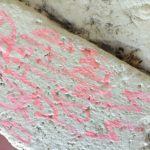
Two days after he shared the experience on Facebook – he found out then that not everyone understood his indignation – disturbing graffiti appeared on the building of his church, the Rhema word of Faith Empowerment Ministries. A swastika with the words “White Power” had been scrawled near the church’s entrance.
“Walk a mile in my shoes”
The “microaggressions” an interviewee referred to — hostile gestures or language that is implicitly biased — are also upsetting. Nailing mentioned, for example, a recent shopping trip at a Chico grocery store.
“I came around a corner with my cart and almost collided with another cart,” she recalled.
Nailing smiled and said, “Excuse me.” But the white man pushing the other cart scowled, scrutinized her and put his arm out in front of his children as if to protect them from her.
Nailing, who is 53, has found what she sees as a change in demeanor surprising. She had spent more than two years living and working with white Ukrainians, who she said welcomed her, and has come home to have experiences and hear stories suggesting that discrimination has worsened.
Church leaders like Haynie and Morton caution against blaming any increase in incidents on fire refugees from communities that were even less diverse than Chico. Haynie, in fact, lived in Magalia above Paradise. “There’s people everywhere who are ignorant,” Haynie says.
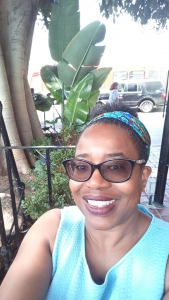
Nailing tries to open the door to dialogue and defeat ignorance whenever possible. For example, she recently saw four young men staffing a table on campus that was covered with Blue Lives Matter literature and the Blue Lives Matter flag.
(Blue Lives Matter is a movement founded by law enforcement officers to counter Black Lives Matter and defend police conduct.)
Nailing said she approached the young men in a friendly manner. “Then I pointed to some of their literature and said that I had a problem with it,” she said.
She told them that while there are some great cops, there are others who have brutalized the African-American community. Nailing explained that living in the United States is different for blacks and whites.
“Then I asked how many black people they had dated, if they had ever gone to a black church or attended a predominantly black school,” Nailing said. “I asked if they had spent time in a black neighborhood, spent the night in the home of a black person or shared a meal with a black family.”
All four shook their heads no, admitting they lacked those experiences. Then she told them to substitute the word “black” for “white” and ask her the same things. Her answer to each question would be yes.
“So what do you know about my people and my community?” Nailing asked. “How can you have any idea what we experience? Where do you get your information? Walk a mile in my shoes and maybe you will understand.”
Nailing suggested that if they really wanted to improve the relationship between law enforcement and African Americans, they could do something — like invite police to leave their uniforms and guns at home and come to a forum or barbecue to talk with students.
The young men were silent but smiling.
“I felt like I was able to reach those kids,” she said.
Leslie Layton is editor of ChicoSol.

My daughter just moved to Chico so far I’ve ran into more good people with good hearts and with live then I have the ones that have all that hate in their heart I like Chico everywhere you go you find racism so you make the best of a bad situation
Yeah that’s bullshit. Your part of the problem, turning a blind eye won’t solve anything